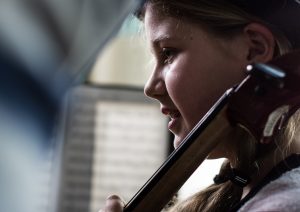Daniel Chandler, Assistant Head of Bolton Music Service and Trust Music Trustee, shares some advice for young musicians practising their instrument at home during the Covid-19 lockdown.
How to Practise Music at Home
Over the past 11 months, it has been inspiring to hear about all the different ways in which Bolton Music Service musicians have continued to enjoy being creative and making music. Whether they are practising an instrument at home, taking part in online rehearsals or perhaps recording themselves for a digital concert, our young musicians have shown themselves to be incredibly resilient and adaptable. It’s certainly been a challenging time for everyone but music has, and always will, continue to play a vital role in helping to maintain positive thinking, express emotion and improve wellbeing in the months and years ahead.

As a young musician, some of my most vivid memories are of the many hours spent learning the Flute at home and then performing in groups with other people. From the early stages of getting to grips with learning how to blow across the instrument (memories of blowing over milk bottles to start with..!) to developing other important technical and musical skills, I can put much of my progress down to having lots of fun. There was also huge amounts of perseverance, helped by the encouragement from those around me at home, and self-discipline. These are just some of the musical and wider personal attributes which are developed by those who enjoy learning a musical instrument.
Here are a few tips for effective practice at home which I hope you find helpful:
1. A suitable and quiet space
It is important that before the instrument comes out of the case, a suitable and quiet space is found at home. This isn’t always easy to achieve, particularly in the current situation, but a room without distraction can really help so that any practice time is well spent. 15 minutes of dedicated practice will have far greater benefit than an hour of interruptions, checking devices and focusing on other things.
2. Set realistic goals
Practising is a skill and it’s important to set realistic goals that are achievable. To make progress, I always try and spend time breaking pieces down into small, manageable sections. Perhaps it is a scale that is particularly challenging, a section of a piece with far too many notes, or even starting a brand new piece – slow, repetitive and patient practice is always the most effective way of making any progress. One really good tip that I learnt from a young age is not to always start from the beginning of a piece. Remember to challenge yourself and always ask your teacher for practice tips!

3. Record yourself
I have found that when I record myself playing a piece and then listen back, the recording can often sound completely different to what I heard when I was playing!
However, this can be helpful so that you can hear what needs to be worked at and, importantly, what is sounding really good. I still have lots of recordings from when I was younger, and it is interesting listening back to them and then hearing the (sometimes occasional!) progress.
4. Be musical
Just because you are playing an instrument on your own at home, it doesn’t mean that you can’t enjoy being musical! We spend so much time as musicians working on the technical aspects of learning an instrument, which is important. However, by simply enjoying playing an instrument, being creative and having fun, we can also enjoy how it makes us feel.

As well as these simple ideas for effective practice at home, it can be hugely rewarding when musicians’ individual skills are brought to a group. At the Music Service, so many young people enjoy this aspect of their music-making each week with a rich variety of musical experiences and ensemble opportunities available to them. Whether it is playing in a group or singing in a choir, all of the practice done at home can become so much more worthwhile.
With everything moving online during the lockdown, it’s been good to hear about the benefits that young people are getting from their weekly lessons and rehearsals. Parents and carers have mentioned the social benefits of maintaining friendships at this time as well as the importance of connecting with other people. Supported by dedicated teachers, our young musicians are making progress. One parent commented that ‘’the online lessons and rehearsals over lockdown are fantastic as Emma has now progressed to grade 4 on her clarinet. Thank you’’.
So, keep practising and enjoy music in all its forms. As the great jazz musician Herbie Hancock once said:
“Music is the tool to express life – and all that makes a difference’’.
More resources for young musicians are available here.